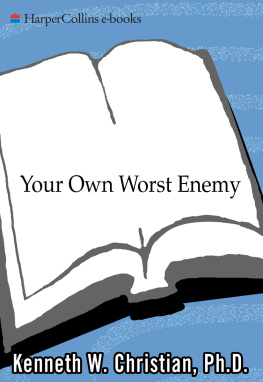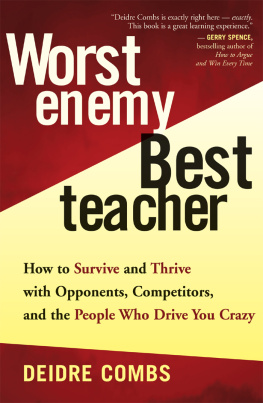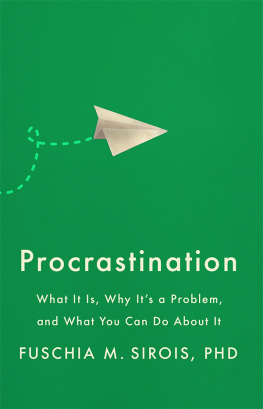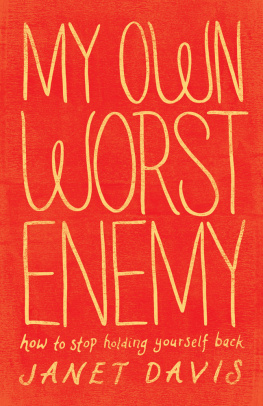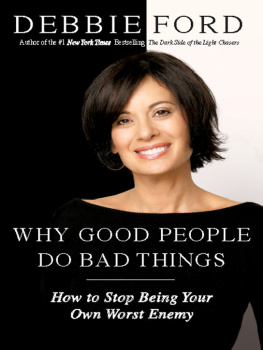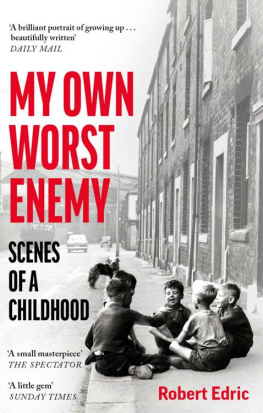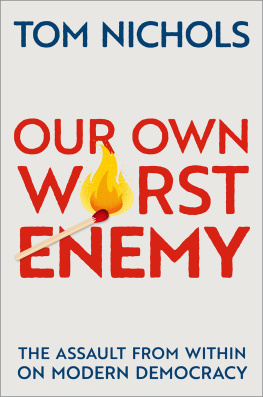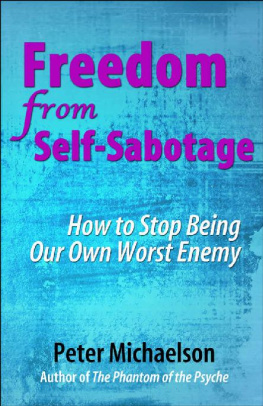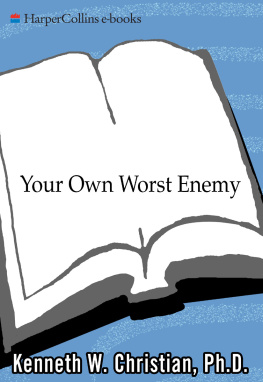Kenneth W. Christian, Ph.D.
have always supported me.
I was driving home from my friend Marks wedding weekend after spending the night with his family. I had met Mark during my freshman year of college, and we had grown close in the years since.
The previous afternoon and evening had been devoted to celebrating Mark and his bride, Susan, but my thoughts kept returning to Marks younger brother, Pete. Seeing him had been unnerving. Pete was in sixth grade when I met him, and everyone had predicted great things for him. Intelligent, charismatic, enthusiastic, playful, he was adored by his family and drew people to him with his spontaneous zest for life. He took accelerated classes and played basketball competitively year-round.
I hadnt had regular contact with Pete since the family moved to the East Coast. Even though I knew from Mark that Pete had slipped from his pedestalhe had graduated in the bottom half of his high school class and later dropped out of college, struggling to find himselfthe wedding was going to be the first time Id seen him in years and I expected to see some of that former exuberance. I wanted to reconnect with him.
Nothing prepared me for what I saw. The bright light was extinguished.
P ete was distant at the rehearsal dinner. I approached him, but he said he was jetlagged, then went to his room. The next day he arrived at the last possible moment for the ceremony. At the reception he dutifully made the rounds but avoided my gaze. Instead of casting his former amiable spell on those around him, he looked like a cardboard cutout. He said the right things, but his remarks to family friends about future plans and how he was doing sounded too cheery.
In my heart I knew he had not grown up. Time had merely passed, and something shining had been lost. He still pretended the world lay before him. Perhaps the deadness I saw in him was caused by an awareness that the world had left him behind. The ambitious, imaginative, mesmerizing kid I had walked to the lake with on summer nights and taken for ice creamthe kid who called me Doc years before I got my Ph.D.was gone.
The day after the wedding I took Pete aside. I needed to understand. At first he deflected my questions. I finally steered the conversation around to the past several years. Biting his lip, his head down and fighting back tears, he began to speak.
Look, he said, I screwed up, okay? I never thought Id be where I am.
Pete stammered out his story. The year before the family moved he had wanted a break from being the perfect student. He was sure hed get back to normal in high school when it really countedbut he didnt. I always told myself Id study next year, but I could never quite get it going, he said. It never quite seemed worth it when next year came. After a while I told myself I didnt care.
It never dawned on Pete that being engaged was not something he could just switch off then easily switch back on again. When he made his choice to take a break from being the perfect student, he began to move in a decisively different direction, leaving behind some part of himself. Before long he had forgotten who he had once been. The one thing he still cared about and excelled at was basketball. But he could no longer rise above the competition on talent alone. He made team practices but didnt work as hard in the summer leagues, and by his senior year he had encountered equally gifted athletes who worked more diligently. Still, he ranked third in scoring in the county that year.
Then he allowed something simply destructive to happen. His high school team qualified for the state championship tournament, but Pete, the linchpin player at point guard, was in trouble with his grades and in danger of failing his government class. His teacher gave him an unprecedented chance to pass by writing a two-page essay on any topic he chose related to the Constitution.
He never wrote it.
What still kills me is that I didnt decide not to write it. I just let the deadline pass. Afterward I couldnt explain why. The guys went on to the tournament with my backup at point guard and got knocked out in the first round. I let down everybodythe team, my family, me.
After the basketball failure Pete went into a funk and never righted himself.
For the first time he looked directly into my eyes.
Tell me, Doc, what kind of person does that?
His question was a kick in the stomach, because I didnt have an answer. I took a deep breath and did what therapists are trained to do. I continued to listen.
The entire time we spoke Pete had a haunted look just behind his eyes. I started to offer to help him find a therapist. Even as I said it my jaw tightened at this automatic response. As a therapist, I knew what was possible, and I didnt really think therapy would help. Now I felt haunted too. Was his depression infectious, or was there something else right in front of me, something I was missing? I told him I would get back to him.
As I drove away from the wedding, I realized that Petes situation seemed naggingly familiar. I thought of Vince, who had come to see me the previous year. Vinces story was so different from Petes story. Or was it? What was I seeing? What was I not seeing?
Vince was not a sought-after star. He didnt have Petes presence or natural charm. Though he was bright, he seemed lost, his face as drawn as Petes had been. But there seemed to be something else about him that I could not put my finger on. I remembered how he had slumped resignedly in his chair, gazing at the carpet, young, yet already very old. He spoke of broken dreams and bad lucknone of the things he tried had worked out. A string of opportunities and shortcuts he couldnt pass up had turned out to be detours into blank walls.
I also thought of Elise, who had had everything going for her but during her first year of law school decided it was not worth it to continue because she no longer wanted that kind of life. When she quit, she thought that some time spent traveling would help her clear her head. But she found that she had no other calling, no other path she wanted to follow. Soon Elise felt aimless, consumed with self-doubt, and she became convinced that she had hit her high-water mark and was receding.
Instead of going home, I drove to my office and started pulling files. Here and there were names of other talented people like Pete, Vince, and Elise, who had been languishing in a similar way when I met them. Trying to find the way these people were connected, I began to look for similarities in their childhood experiences. Then I recalled Clarissa, one of my daughters friends from preschool, who began school with enthusiasm and at some point faltered. Clarissa was bright and had no learning problems. As a consultant at a rehabilitation center, I had seen cases of serious learning disabilities. Clarissa did not suffer from any such disability. And I did not detect anything that would have interfered with her concentration. Like Pete, Vince, and Elise, she simply seemed to contract and stop putting out effort.
Scanning one file after another of adults, children, and concerned parents, I recognized that what I was seeing was not an isolated phenomenon. My practice was made up of adults, couples, and families. Perhaps 80 percent of the parents who had brought in their adolescents had expressed, among other concerns, worries about their childrens school performance. Sometimes these kids were like Petechildren with potential, frittering it away. I had helped some of the children, but with others I was not satisfied with the results of my efforts. What was different about them, and what did they need? I didnt know, and I wasnt sure anyone else knew either.

